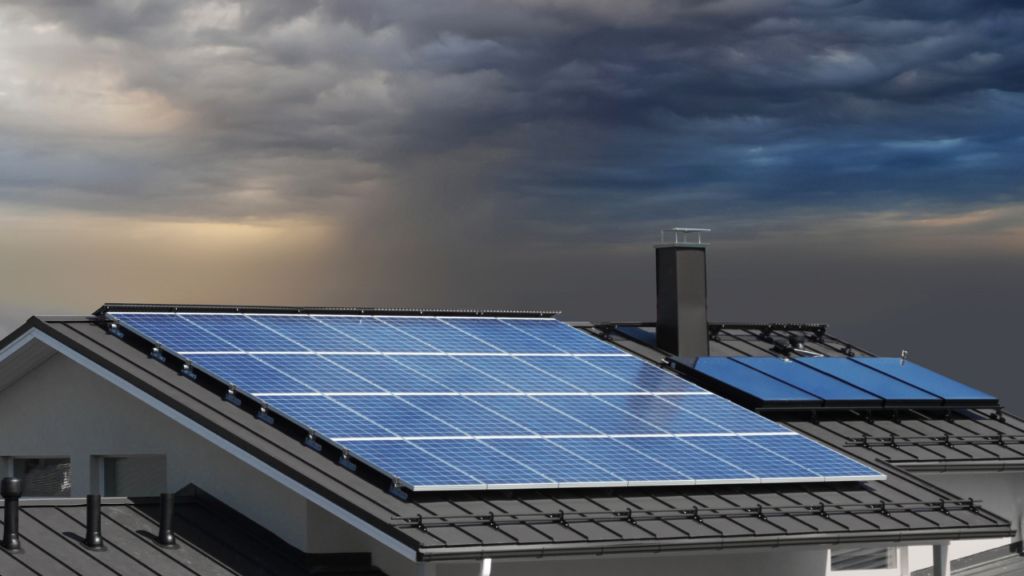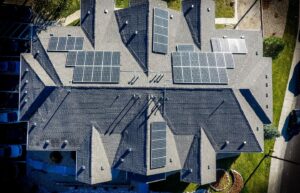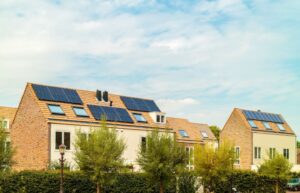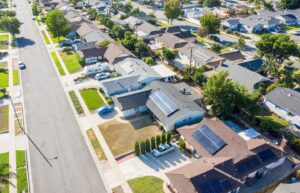Are you curious about whether solar panels can still generate electricity during low sunlight hours, windy conditions, or inclement weather such as snow? If you live in regions like Aurora, Colorado, where sunlight hours aren’t always guaranteed. Well, Solar by Peak to Peak has good news for you!
Solar panels work even on days with heavy cloud cover and snow and can still generate electricity during reduced sunlight hours. The light that filters through the clouds still provides enough coverage to activate the solar power system’s photovoltaic (PV) cells and convert sunlight into electricity. This process is possible thanks to the solar panel surfaces. Cloud cover does not hinder the basic functioning of solar panels either, as rainfall does not affect the sun.
So, if you were unsure whether solar panels would work effectively during less-than-ideal weather conditions, rest assured that they do! Solar panels are designed to harness the sun’s power, regardless of the weather in March when Colorado sees an uptick in inclement weather. Their efficiency and rate of energy production remain consistent, providing a reliable source of renewable energy.
Solar panels’ efficiency and energy production rate remain stable, ensuring a dependable source of renewable energy. PV panels offer a consistent and sustainable method for harnessing solar energy, even with occasional cloud cover or rain. These solar panel surfaces effectively capture sunlight throughout the year, including in March.
Impact of Rain and Wind on Solar Panel Efficiency
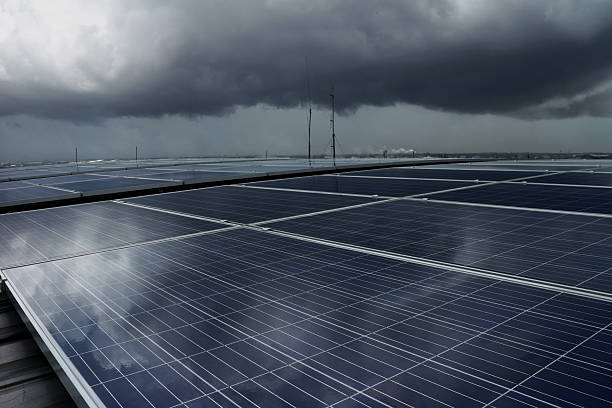
Rain and wind are natural elements that can affect solar panels’ efficiency in capturing the sun’s energy, especially during March.
Rain Helps Clean Dust and Debris from Solar Panels
One surprising benefit of rain and sun is their ability to clean solar panels. Over time, dust, pollen, bird droppings, and other debris can accumulate on the surface of the panels, reducing their ability to convert sunlight into electricity. However, when it rains, the water acts as a natural cleanser by washing away impurities from solar panel surfaces, ensuring the efficiency of PV panels. This cleansing effect helps maintain the optimal performance of solar panels by ensuring that sunlight reaches the photovoltaic cells without obstruction on the panel surfaces.
Wind Causes Slight Vibrations but Doesn’t Significantly Affect Efficiency
While wind can cause slight vibrations in solar panels due to its forceful nature, these vibrations do not significantly impact panel efficiency. Manufacturers design solar panels with sturdy materials that can withstand normal wind conditions without compromising functionality. Solar panels remain resilient even in areas prone to strong winds like Aurora, Colorado, where gusts occasionally reach high speeds.
Proper Installation Ensures Effective Drainage
Proper installation is crucial for ensuring that rainwater drains off the panels efficiently. Installers take specific measures to prevent water accumulation when installing solar panels in areas such as Aurora, with frequent rainfall. They angle the panels downward so rainwater naturally flows off them instead of pooling on their surfaces. They incorporate drainage systems or gaps between each PV panel to facilitate water runoff.
Utilizing these installation methods effectively mitigates any potential harm that excessive rain may cause to solar panel surfaces. The design allows for efficient drainage while protecting solar panels against damage or decreased efficiency due to prolonged exposure to moisture.
Performance of Solar Panels During Rainy Weather
Solar panels are popular for harnessing renewable energy, but many wonder how well they perform in rainy weather. While it is true that solar panel performance may decrease during heavy rainfall due to reduced sunlight exposure, modern technology has made significant advancements that allow for some power generation even under overcast skies.
“Thanks to these technological innovations, your solar panels remain adept at generating electricity, showcasing their ability to function reliably in diverse weather conditions. Although heavy rain might decrease the sunlight reaching the panels, these advancements ensure a consistent power output.
It’s crucial to remember that factors like rain intensity, duration, and the quantity of solar panels in use influence the extent of this reduction in power production. With these technological breakthroughs, you can trust that your solar panels will continue to play a pivotal role in sustainable energy solutions, regardless of the weather conditions.
Light or Moderate Rain Showers
Solar panels can still generate electricity during light or moderate rain showers, although at a lower rate than on sunny days. The water droplets from the rain can help clean the panel surfaces by washing away dust and debris, improving their overall performance. Solar panels may produce more energy immediately after rainfall due to the cleaner surface.
Heavy Rain
Nonetheless, even in regions with heavy and frequent rain, such as Aurora, Colorado, solar panels continue to demonstrate their resilience. While it’s true that persistent heavy rain and cloud cover can temporarily reduce the sunlight available for electricity generation, modern solar panels are designed to adapt and still produce power under these conditions. Although power production may experience fluctuations during extended rainy periods, solar panels continue to contribute to sustainable energy solutions, ensuring a positive impact on your energy needs, rain or shine.
Snow and Other Forms of Precipitation
It’s worth mentioning that while rain affects solar panel performance, other forms of precipitation, like snow, can have an even greater impact. However, solar panels provide valuable energy savings throughout the year, even with reduced performance during rainy or snowy seasons.
Built-in Protection of Solar Panels from Water Damage
Properly designed solar systems are equipped with measures to prevent water ingress into sensitive electrical components. This ensures that even during heavy rainfall, there is no risk of damage to the internal workings of your system. Components such as inverters and wiring are carefully sealed to protect them from moisture-related issues.
In addition to being safe for the environment and having built-in protection against water damage, rain can also help improve the performance of your solar panel system in certain situations. When raindrops hit the surface of your solar panels, they can wash away dust, dirt, and other particles that may have accumulated over time. This cleansing effect allows the panels to receive more sunlight and operate efficiently.
Furthermore, rain can help cool down solar panels during hot weather conditions as it helps prevent overheating, allowing your panels to generate electricity more effectively.
Effectiveness of Solar Panels in Cloudy Conditions
Solar panels are popular for renewable energy generation, but many wonder about their effectiveness in cloudy conditions. Solar panel efficiency decreases when there is reduced sunlight availability due to cloud coverage. However, advancements in technology have improved their performance under low-light conditions.
Amount of Direct Sunlight Reaching the Panels
One of the major factors affecting solar panel efficiency on a cloudy day is the amount of direct sunlight reaching the panels. Clouds act as barriers, reducing the intensity of direct sunlight and causing a drop in energy production. This can be particularly challenging in areas with high cloud cover.
However, it’s important to note that solar panels can still generate electricity even when it’s cloudy. They are capable of capturing indirect sunlight or diffuse light from the sky.
Thin-film technology has been developed specifically to enhance their performance under such conditions. These panels are more efficient at converting indirect sunlight into usable energy than traditional photovoltaic cells.
In areas like Aurora, where cloud coverage can be significant during certain seasons, consider installing additional solar panels to compensate for lower energy production during extended periods of cloudiness. More panels means a higher capacity for capturing available sunlight and generating electricity.
While clouds pose challenges for solar panel effectiveness, they also bring some benefits. For instance, cooler temperatures on cloudy days can improve the overall efficiency of solar panels by reducing heat-related losses. Rain showers help keep the surface of the panels clean from dust and debris, which can further optimize their performance once the clouds dissipate.
To summarize:
- Solar panel effectiveness decreases in cloudy conditions due to the reduced availability of direct sunlight.
- Advancements like thin-film technology have improved their performance under low-light conditions.
- Installing additional panels can compensate for lower energy production during extended periods of cloudiness.
- Cooler temperatures on cloudy days can improve overall efficiency by reducing heat-related losses.
- Rain showers help keep the surface of the panels clean from dust and debris, optimizing performance.
Storing Solar Energy for Nighttime Use and Cloudy Days
Battery storage systems are a game-changer. These innovative systems allow excess energy generated during sunny periods to be stored for later use, ensuring that solar panels continue to work even in the rain. Let’s explore how these batteries provide a reliable source of electricity at night or when there’s limited sunlight available.
Solar energy storage systems have become increasingly popular in Aurora, Colorado, where sunlight hours vary throughout the year. By capturing and storing surplus energy produced by solar panels during peak daylight hours, these systems ensure a continuous power supply even when shadows from clouds darken the skies.
Maximizing Self-Consumption
One of the key advantages of battery storage is its ability to maximize self-consumption. Instead of relying solely on the grid for electricity during non-sunny periods, homeowners with solar energy storage can tap into their stored power reserves. This reduces their reliance on external sources and allows them to use their own renewable resources better.
Consider the following: It’s been raining all day in Aurora, but thanks to your solar system coupled with a battery storage solution, you’re still enjoying an uninterrupted power supply. While your neighbors may depend on traditional electricity sources or backup generators, you’re harnessing the surplus energy you generated during sunnier times. This keeps your lights on and saves money by reducing reliance on grid-supplied electricity.
What is the Science Behind Solar Energy Storage?
The science behind solar energy storage lies in photons, particles of light, which photovoltaic cells absorb within solar panels. These cells convert sunlight into electrical energy that can be used immediately or stored later. When excess electricity is generated and not consumed in real-time, it flows into the battery system, where it is safely stored until needed.
During nighttime or cloudy days when sunlight is limited, the battery system seamlessly takes over as the primary source of electricity. This ensures that your appliances, lights, and other electrical devices function without interruption. It’s like having a solar-powered backup generator.
Solar energy storage systems offer numerous benefits beyond simply working in the rain. They provide peace of mind, knowing you have a reliable power source regardless of external conditions. These systems contribute to a more sustainable future by reducing reliance on fossil fuel-based electricity generation.
Maximizing Energy Savings with Solar Battery Storage
Solar panels have become an increasingly popular choice for homeowners in Aurora and Colorado. They offer a sustainable and cost-effective solution to meet the energy needs of homes while reducing dependence on the electric grid.
Store Energy with Solar Battery Storage Systems
One of the key advantages of battery storage systems is their ability to enable homeowners to utilize stored solar energy during peak electricity tariff hours. By storing excess solar power generated during sunny periods, homeowners can tap into this stored energy when utility rates are higher. This ensures that they use clean and renewable energy and increase their overall savings by avoiding expensive electricity from the grid.
Solar Battery Systems Provide an Essential Backup Power Source During Grid Outages
Solar battery systems provide an essential backup power source during grid outages. When severe weather or other factors disrupt the flow of electricity from the utility grid, homeowners with battery backups can ensure an uninterrupted power supply to their homes. This is particularly crucial in areas like Aurora, where extreme weather conditions occasionally lead to power outages.
To fully grasp the benefits of solar battery storage, it’s important to understand how it works in conjunction with a solar energy system. Solar panels generate electricity by converting sunlight into usable energy through photovoltaic (PV) cells. Excess energy produced during daylight hours is sent back to the electric grid through net metering, allowing homeowners to receive credits for their contribution.
Diverting Solar Energy to Charging Solar Batteries
However, instead of returning all excess energy to the grid, homeowners can divert it towards charging batteries connected to their solar system. These batteries store the electrons the PV cells produce and make them available anytime—even when it’s raining or cloudy outside. Homeowners can maintain a consistent power supply throughout weather conditions by relying on stored energy rather than on immediate production.
Investing in a solar battery system is a wise choice for homeowners looking to maximize their energy savings and reduce their reliance on the utility grid. Not only does it provide backup power during outages, but it also allows for strategic use of stored energy during peak tariff hours. By utilizing battery storage technology, homeowners can harness the full potential of solar panels and enjoy uninterrupted electricity while saving money.
Calculating the Number of Solar Panels Needed for Optimal Performance
One of the key considerations is determining the right number of panels needed to ensure optimal performance. Several factors come into play when making this calculation, including energy consumption and location. Considering these factors, you can ensure that your solar panel system generates enough electricity to meet your needs.
A professional assessment is crucial in determining the ideal number of solar panels for your specific requirements. This assessment considers average sunlight hours, panel efficiency, and desired energy output. Let’s delve deeper into each of these factors.
Average Sunlight Hours
The amount of sunlight your location receives significantly determines how many solar panels you need. Areas with more sun exposure will require fewer panels than regions with limited sunlight. For instance, if you live in Aurora, Colorado, which boasts an average of 245 sunny days per year, you can expect higher power output from your PV panels than in areas with less favorable weather conditions.
Panel Efficiency
Another factor when calculating the number of solar panels required is their efficiency rating. The efficiency rating indicates how effectively a panel converts sunlight into electricity.
Higher-efficiency panels produce more power per square foot than lower-efficiency ones. When consulting experts for a professional assessment, they consider the efficiency ratings and recommend an array that matches your needs.
Desired Energy Output
Determining your desired energy output is essential to ensuring your solar panel system meets your daily power requirements. Experts consider both current and future needs when making this calculation. By analyzing historical data on your energy consumption and factoring in any planned increase or decrease in usage, they can provide accurate guidance on the necessary capacity of your system.
To give you an idea of what calculations might look like based on different scenarios:
- You may require more panels to generate the desired power output if you have high energy needs due to running multiple appliances and a large household.
- On the other hand, if your energy needs are relatively low, such as for a smaller home or lower consumption habits, you may need fewer panels.
It’s important to note that solar panels generate electricity even on cloudy or rainy days.
While their power output might be slightly reduced during inclement weather, they still contribute to your overall energy production.
Do Solar Panels Work in the Rain?
Solar panels do work in the rain. While rain may reduce the overall efficiency of solar panels, they still continue to generate electricity. In addition, rain can help clean the surface of solar panels, allowing them to absorb sunlight more effectively when the skies clear up. So don’t worry about a little rain; your solar panels will keep working for you!
Investing in solar energy is not only environmentally friendly but also financially beneficial. By harnessing the power of the sun, you can significantly reduce your electricity bills and contribute to a greener future.
Ready to harness the power of the sun, rain or shine? Discover how Solar by Peak to Peak can help you make the most of renewable energy. Whether it’s sunny skies or a rainy day, our solar solutions are designed to keep your energy flowing. Join the sustainable energy revolution and contact Solar by Peak to Peak today! Let’s make every weather condition work in your favor!

